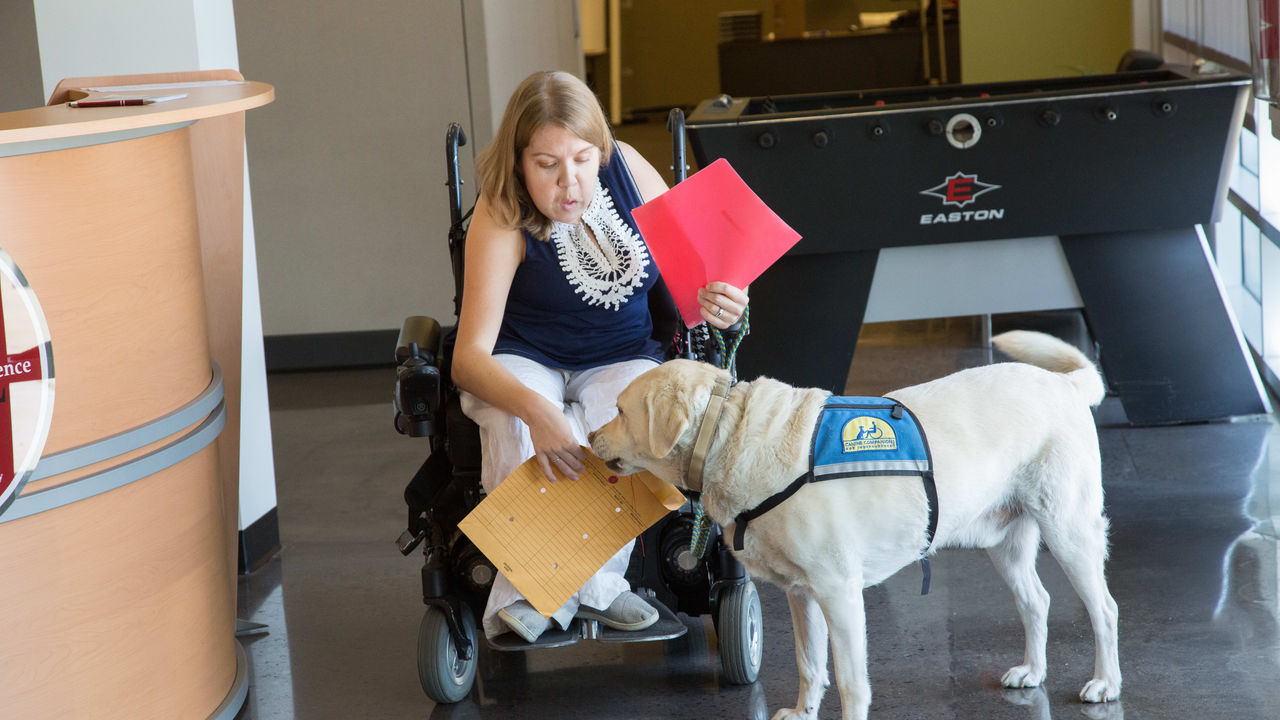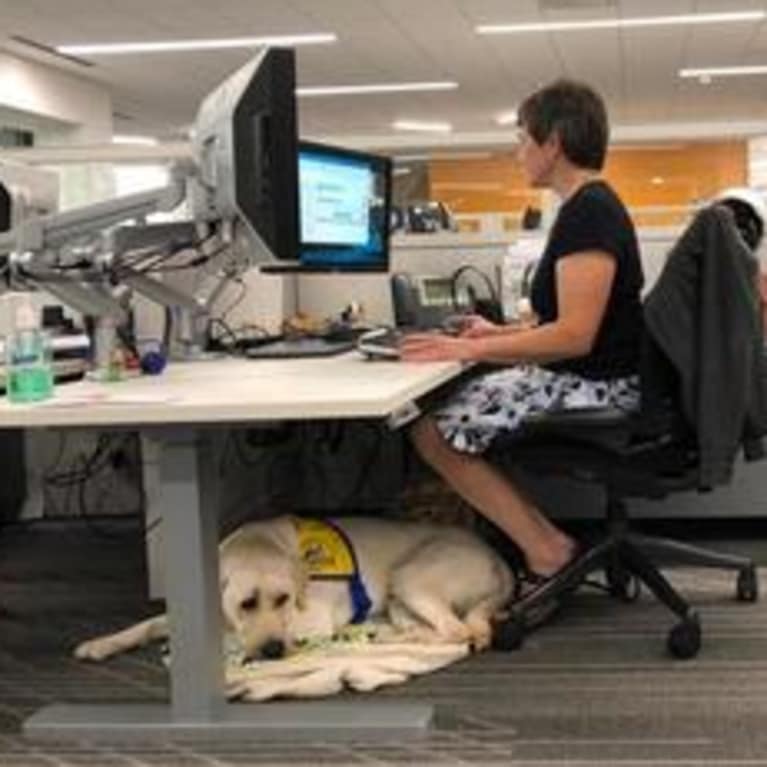
Ditto, a 9-year-old black Lab, curled quietly at the feet of Vivian Fridas in a crowded ballroom during a forum on disabilities, his dark-brown service harness with its reflective blue strap stretched across his midsection.
Fridas, 30, was born with retinal degenerative disease, a type of vision loss that affects a wide range of everyday tasks. She relies on Ditto, instead of a cane, to get around. He's been on job interviews with her. He goes with her daily to the U.S. International Council on Disabilities in Washington, D.C., where Fridas is the program manager. He attends meetings and even team-building events.
Dogs such as Ditto that are trained to perform tasks for a person with a disability are considered a reasonable accommodation under the Americans with Disabilities Act (ADA), according to the U.S. Department of Justice (DOJ) Civil Rights Division. Their tasks must be directly related to the disability of the person handling the dog.
"We work as a team to get from point A to point B," Fridas said of the dog she called her "little partner."
"He has to have certain problem-solving skills," such as the ability to find stairs and doors and know commands like forward, left and right. "If he sees a trash can in the middle of the road … he'll take me around the obstacle."
Ditto was trained at Guiding Eyes for the Blind, based in Yorktown Heights, N.Y. The ADA does not require service dogs to be professionally trained but they must be taught—by an owner or someone else—to take a specific action when needed to assist a person with a disability.
Some dogs, like those from Canine Companions for Independence, headquartered in Santa Rosa, Calif., work with people who have a hearing impairment, cerebral palsy or spina bifida.
A dog assisting someone with cerebral palsy, for example, could retrieve items off the floor, turn on light switches, activate a button that opens a door and pull a manually operated wheelchair. The dog may be trained to assist when its handler has an epileptic seizure, alert its hearing-impaired handler to sounds or remind its handler to take medication for depression.
Service animals tend to be dogs and can be any breed. However, miniature horses, which are covered under the ADA, sometimes are used by people who are sight impaired, said Robert Schwinn, Canine Companions spokesman.
Emotional service, therapy, comfort or companion animals are not considered service animals under the ADA's Title III public accommodation provisions because they have not been trained to perform a specific task, according to Peter Petesch, partner at Washington, D.C.-based law firm Littler Mendelson.
However, Title III does distinguish between a psychiatric service animal and an animal that simply provides comfort. A dog trained to sense an impending anxiety attack and take a specific action to help avoid or lessen its impact would qualify as a service animal.

Title I regulations govern the workplace. Under it, "an emotional support animal could conceivably be an accommodation for an employee in the workplace," such as for a veteran with post-traumatic stress disorder, Petesch said.
Handling Accommodation Requests
ADA regulations covering public spaces such as movie theaters define and restrict what a service animal is by task and species. Those regulations don't automatically translate to Title I, "so we find ourselves in this fuzzy area," Petesch said.
It's no wonder that accommodating requests for service or emotional-support animals can be confusing for HR professionals and their organizations. Adding to the complexity—and one of his pet peeves—is the rise in instances of people passing off family pets as service animals.
[SHRM members-only toolkit: Accommodating Employees' Disabilities]
That's when things go to the dogs, he said.
"We need to start looking at this in a disciplined fashion," Petesch said. However, "don't automatically assume that a request for an emotional-support animal is bogus," he cautioned.
He offered the following tips for accommodation requests:
Treat service animals like any other accommodation inquiry. "There shouldn't be a great deal of controversy in allowing that animal into most workplaces," he said. Exceptions would be made for safety reasons, such as barring a service animal from an area where there is forklift traffic or an operating room where a sterile environment must be maintained.
Also, "don't assume the employee always has to bring the dog or other animal into the workplace. You've got to dig a little bit deeper. … A lot of people out there are playing the system, wanting to bring their pets into work."
Explore alternatives. Allowing a service animal is not a legal obligation if another accommodation is available.
Danette Washum, ADA manager at Unum, an insurance company with U.S. headquarters in Chattanooga, Tenn., recalled a request from a woman who had diabetes. She often skipped lunch breaks at work and wanted her dog around to alert her when her blood sugar dipped dangerously low. Her doctor agreed with the employer that a better accommodation was to schedule food breaks on her e-mail calendar, Washum said.
Consider requests on a case-by-case basis. Petesch has heard of employees going on business travel who wanted accommodations for their service dogs that don't like to ride on planes. Is it reasonable to provide a rental car for an employee to drive from Los Angeles to New York City? No, he said. It probably is reasonable, though, to provide a rental car to drive from Los Angeles to San Diego.
Request reasonable documentation, such as a doctor's note, if appropriate.
Treat the information confidentially. Talking to the manager of the employee who has requested the accommodation is permissible, but don't announce the request or the reasons behind it to others unless the employee authorizes you to do so.
Set ground rules—such as where the employee will take the dog to relieve itself. Employers have the right to expect appropriate behavioral standards. The accommodation is "a trial-and-error process" and should be evaluated on an ongoing basis, Petesch said.
Have a plan. "Have a sense of the questions you need to ask" the employee, he recommended to HR. "Have a sense of the rules of conduct you would expect of any employee bringing an assistance animal into the workplace."
Establish a uniform workplace accommodation policy, instead of having a separate policy covering service and emotional-assistance animals. "When you have an animal-specific [accommodation] policy, it tends to isolate and stigmatize that condition or that accommodation from other ones," Petesch said.
Communication
It's important to talk with the employee you are accommodating to learn what information he or she is comfortable sharing about why the animal is present and any etiquette for interacting with it, said Fridas, Ditto's owner. Petting and talking to the animal and handing out treats could cause the dog to no longer see the handler as being in command and lead to a safety issue.
And HR should be prepared for questions from others who may want to bring their own dogs—that are not service animals—to work, Canine Companion's Schwinn advised.
If it already allows dogs, the employer may want to reconsider its policy and consult with the employee who has a service animal.
"Bring Your Dog to Work Day is cool, but it can have unintended consequences for people with service animals," Schwinn said. "When service animals interact with other dogs that may or may not be trained, it can have negative effects on them if other dogs are barking, lunging. It can induce fear in the service animal if it happens repeatedly over time," he said.
Employers need to be prepared for animal accommodation requests. They are becoming common, Petesch said.
"Address it in the same mature, structured fashion [you] would for any other accommodation request. Mainstream it. That doesn't mean you have to always say yes."
Advertisement
An organization run by AI is not a futuristic concept. Such technology is already a part of many workplaces and will continue to shape the labor market and HR. Here's how employers and employees can successfully manage generative AI and other AI-powered systems.
Advertisement


